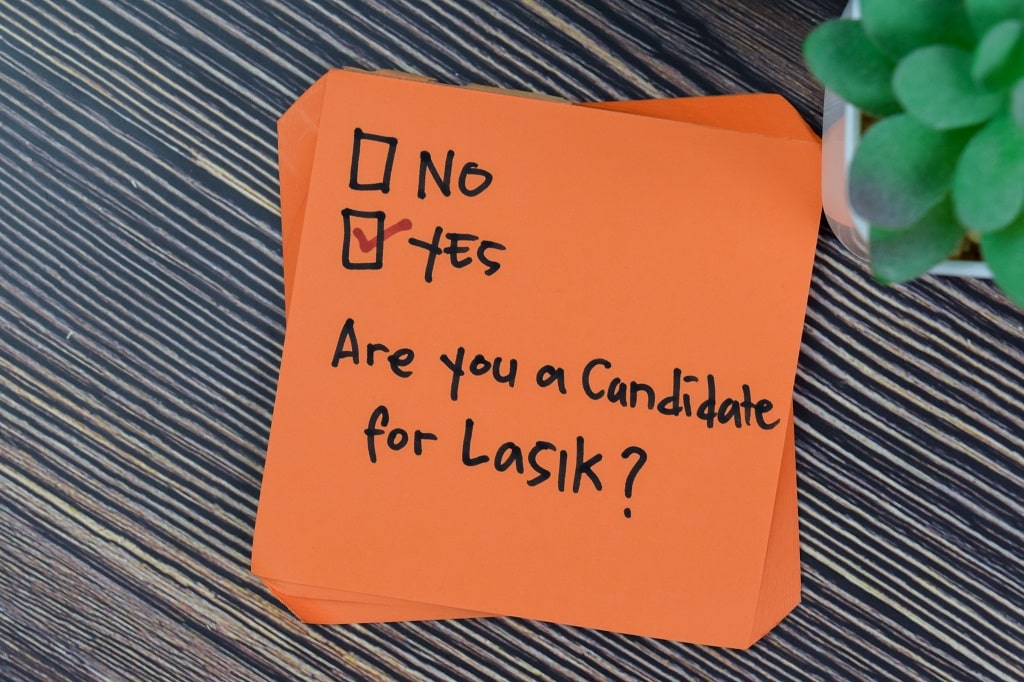

Lasik eye surgery revolutionized the way we think about vision correction, and after delivering great results for over two decades, it has become a household name that most are familiar with. The outcomes are overwhelmingly positive with 98% of patients expressing satisfaction with their decision to have laser vision correction. So, who is a good candidate for lasik eye surgery? A thorough surgical evaluation and consultation is the first step in helping determine if you qualify and if your eye meets the requirements for Lasik eye surgery.
There are many things to consider when determining who is a good candidate to have lasik eye surgery. If you are unsure about any of the following the surgical consultation will help provide the answers.
There are some limits on the amount of prescriptions that can be corrected with lasik. The current FDA guidelines are:
If your prescription exceeds these limits, there are other types of surgical procedures available to us, and other measurements gathered will help determine your best options.

Another important factor to consider when getting lasik eye surgery is a stable prescription, meaning that your glasses and contact lenses have not changed in the last 12-24 months. When can you get lasik and what is the age limit are common questions prior to surgery. 18 years of age is the starting point of lasik’s candidacy and while there is no upper age limit, other factors such as presbyopia (the loss of our ability to focus on near objects) and cataract formation will occur as we age. Statistically, 90-95% of prescriptions will be stable as we reach our early 20’s.
Your overall health can play a role and is one of the important factors to take into account when thinking about lasik requirements. Systemic conditions such as uncontrolled diabetes, autoimmune disorders (rheumatoid arthritis, Sjogren’s syndrome, etc.), and significantly dry eyes will need to be addressed before surgery or may contraindicate doing Lasik eye surgery.
A topographical corneal map will be taken at your consultation to determine the shape of your cornea. This helps rule out any asymmetry or steepening inferiorly that can be an indication of keratoconus or a risk factor for postoperative ectasia (weakening of the corneal structure) after lasik eye surgery. Pupil size has long been talked about in regards to candidacy. The thought being that larger pupils can have a higher incidence of halos or glare after surgery. Newer technology lasers and larger treatment zones have all but made this concern obsolete.
Corneal thickness is important and if a cornea is made too thin, it can be made structurally weaker (ectasia). Lasik eye surgery changes the power of the eye by removing tissue and making it thinner. Measuring the thickness of the cornea and checking your glasses prescription allows a quick calculation to be done to ensure there is adequate corneal tissue for surgery. In the event your prescription can not be treated due to a thin cornea, there are alternative surgical options that may be considered (PRK and ICL implants).
It is important to disclose and discuss eye conditions such as amblyopia (lazy eye) and strabismus (muscle imbalance) requiring prism in your glasses. Any previous eye surgeries or eye trauma should also be mentioned in your surgical evaluation.

Several factors are taken into account to assure you are a good candidate and ready for laser vision correction surgery. Your prescription needs to be stable over the prior 12 months and your body should be at a mature level which most consider being 18 years of age.
Disqualifiers for surgery can be if you have had prior eye trauma or current or prior eye disease.
It is important for patients to have realistic expectations. For those over age 40 if both eyes are treated for best distance vision they will need reading glasses at some point. For all patients, there is a possibility, although low, that they may need an enhancement procedure. Additionally, laser vision correction ( LASIK, SMILE, and PRK ) are surgical procedure, and like all operations, there is a risk of loss of vision from infection or other issues that can occur, and all of your questions should be answered to your satisfaction prior to undergoing surgery.
Patients with certain conditions may not be considered candidates for laser vision correction. Patients with thin or irregular corneas who can’t do lasik may consider other surgical procedures that don’t involve the cornea. Lasik contraindications include patients with uncontrolled eye diseases such as glaucoma or diabetes, and those conditions should be treated and controlled prior to consideration for surgery. Patients that have corneal scarring from prior infections may not be candidates for surgery.
If you are asking “is LASIK right for me“ it is important to remember that LASIK is a surgical procedure and you need to evaluate it carefully. LASIK for most people is a tremendous life changing event with many saying it is the best thing they have ever done for themselves. If one is tired of glasses and contact lenses, LASIK is a great option to increase one’s quality of life and freedom from glasses and contact lenses. Lastly, if you are considering LASIK as an option, do give it your time and attention and get a thorough eye examination by a well qualified surgeon and care team and have all of your questions answered to your satisfaction.
To learn more about what to expect from LASIK at Discover Vision Centers take our quick self evaluation online.